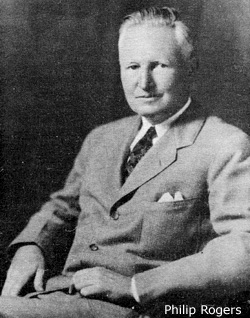Philip Rogers
 Philip Rogers, the fifth president of the Millers Falls Company, was the son of long-time company secretary and treasurer, George E. Rogers. Born in Greenfield, Massachusetts, in 1888, he earned his degree in mechanical engineering at the Sheffield Scientific School, a semi-autonomous unit within Yale University. After graduating in 1910, he began working for the Millers Falls Company taking a position in the heat and dirt of the foundry core room. He soon became a machinist in the Automatic Screw Department and moved from there to the tool room where he became the company’s head draftsman. In 1915, Philip Rogers was promoted to head of the operation’s Production Planning Department, a position he left in 1917—the year that the United States entered the Great European War. Rogers enlisted in the armed forces, served a two-year tour as an ordnance lieutenant in Rochester, New York, and returned to the factory as assistant plant superintendent in 1919.(1)
Philip Rogers, the fifth president of the Millers Falls Company, was the son of long-time company secretary and treasurer, George E. Rogers. Born in Greenfield, Massachusetts, in 1888, he earned his degree in mechanical engineering at the Sheffield Scientific School, a semi-autonomous unit within Yale University. After graduating in 1910, he began working for the Millers Falls Company taking a position in the heat and dirt of the foundry core room. He soon became a machinist in the Automatic Screw Department and moved from there to the tool room where he became the company’s head draftsman. In 1915, Philip Rogers was promoted to head of the operation’s Production Planning Department, a position he left in 1917—the year that the United States entered the Great European War. Rogers enlisted in the armed forces, served a two-year tour as an ordnance lieutenant in Rochester, New York, and returned to the factory as assistant plant superintendent in 1919.(1)
Rogers became Millers Falls Company president in 1920 and stayed with the job for forty-two years. His first decade of service resulted in the acquisition of the National Machine Company, the West Haven Manufacturing Company, and the Accurate Level Company—purchases that were made to expand and solidify the company’s product line. The decade was notable as well for the introduction of the firm’s first electric tools, a necessary development if the business was to remain competitive in a rapidly changing market. In 1930, Rogers presided over a merger that resulted in the Millers Falls Company absorbing the nearby and overextended Goodell-Pratt operation—a failing business almost as large as Millers Falls itself. The merger took place against the backdrop of the Great Depression and required a massive consolidation of the product line during an economic downturn so severe that plant operations were curtailed to several days per week. As the decade wore on, the company’s prospects gradually improved, and the beginning of World War II brought with it an unprecedented demand for the operation’s tools.
Rogers found managing the business during the Second World War to be particularly stressful. A biography of the long-time president in the November 1955 issue of Dyno-mite, the company’s employee magazine, noted:
The problems multiplied fast in 1940, before we were drawn into World War II ... More production, more, and still more! Fewer men to man the machines and still fewer. Green help, trainees, long hours, overtime pay. Security regulations and government controls. These soon became the order of the day. P. R. [Philip Rogers] gave up golf about that time. He just didn’t feel like playing when he left his office at the end of a day’s work.
In addition to his duties as president of a company that had become a national defense contractor, Rogers volunteered as coordinator of the Greenfield-Athol region for the Massachusetts Industrial Committee for National Defense and served on the Greenfield National Defense Committee. He never did return to his regular golf game after the war ended but unwound instead by walking his dog, doing crossword puzzles, reading four daily newspapers, and looking through the weekly news magazines. Early to bed and early to rise, Philip Rogers enjoyed listening to popular and classical music but was slow to accept the idea of watching television.
A product of his times, Rogers practiced an approach to employee management that is commonly referred to as paternalism. Although the practice is at times maligned by historians, relations between labor and management at the Millers Falls plants were generally good. As Philip Rogers grew older, both he and Earl D. Holtby—the company’s chief financial officer—grew financially conservative. Their cautious approach to re-investing in the firm gradually took a toll on the operation, and by the time of Rogers’ retirement in 1962, the company’s facilities and tooling had become substandard.
Philip Rogers served as a director for Greenfield First National Bank and Trust and as a trustee of the Franklin Savings Institute. He and his wife, the former Rubie Dumont, had one son, whom they named George. Philip Rogers died in October of 1971.
Illustration credit
Millers Falls Company. Dyno-mite. November 1955.
References
- 1. Sources: “Our President.” Dyno-mite. November 1955, p. 12-14; “Rogers Learned Business by First Hand Experience.” A Century of Experience: Millers Falls Company. Greenfield, Mass.: Greenfield Record, Gazette and Courier, August 13, 1968. unpaged.